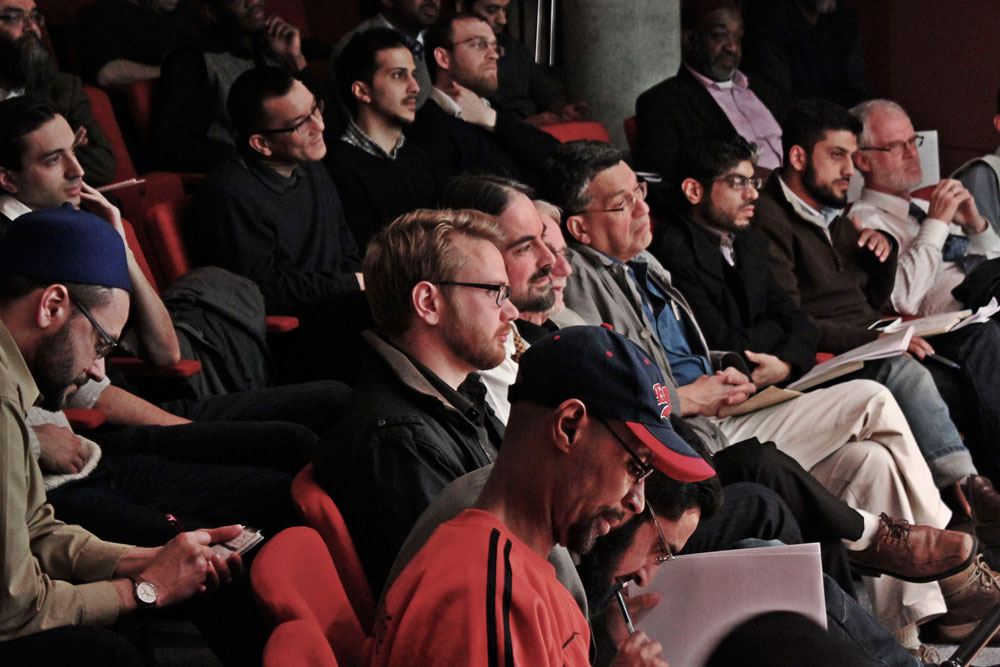Review
All lectures are freely available on this site.
Spring Symposium 2012
 The Curve Auditorium
The Curve Auditorium
Prophethood, Power and Privilege
The inaugural symposium of the Muslim Faculty of Advanced Studies took place in Norwich, UK on Saturday 12th of May at the Curve Auditorium which is located within the Forum, the city centre’s recently constructed civic showpiece. The related themes of prophethood, power and privilege provided the thread which ran through all three lectures and was the focal point for the concluding symposium. The lectures were attended by approximately 60 people and were intended to provide the attendees with an indication as to the ground to be covered in next term’s courses, as well as supply the basis for participation in the symposium itself, which was conducted by the Dean of the Faculty, Abdassamad Clarke, and the Warden, Uthman Ibrahim-Morrison.
After a brief introduction by the Warden to the overall vision, aims and purposes of the Faculty, the opening lecture entitled Islam: the Natural Form of Man, was given by the Rector, Shaykh Abdalhaqq Bewley, which laid the first essential foundations for further exploration of the day’s central themes: prophethood, power and privilege.
The second lecture consisted of an in-depth introduction by the Dean to the History of the Khalifas course, which is due to commence in September this year. Besides providing the necessary framework, terminology and basic definitions for these historical studies, the Dean also presented an overview of the main historical events and principal political issues which characterised the different caliphates, ranging from the Khulafa Rashidun, via the Banu Umayya and Banu al-‘Abbas, through to the collapse of the Osmanlis at the beginning of the last century.
The last lecture of the day before the symposium proper was the Warden’s introduction to the Politics of Power course, which is also due to begin in September. After defining the parameters of the subject matter, which also included a clear statement justifying its contemporary importance for Muslim scholarship and leadership, the lecture proceeded to provide an account of the subject as presented in The Time of the Bedouin (Ian Dallas 2006) which takes the French Revolution and its legacy as the starting point for understanding the political ‘genealogy’ of all major contemporary nation states.
The day’s intellectual exertions were concluded by the symposium where the lecturers and participating students focussed largely on the question of language in relation to the ability or inability, in this instance, to communicate effectively for the purposes of any enterprise requiring collaborative intellectual enquiry. This was experienced by most of those present as a shocking revelation, but convincing evidence nonetheless, of the usefulness of the exercise. As an introduction to the Faculty and the upcoming courses in September, the Spring Symposium was a clear indication of the Faculty’s approach to the advancement of Muslim scholarship, teaching and enquiry into those branches of knowledge deemed to fall within the ambit of its motto, and lecturers and prospective students alike seemed to be satisfied that the ground had been well laid for the Politics of Power and the History of the Khalifas courses in September.
Abdalhakim Andersson
Director of Studies
Proceedings of the Symposium:
Study pack from the Spring Symposium 2012 containing the transcripts of:1. The History of the Khalifas – An Overview by Abdassamad Clarke, Dean of the Muslim Faculty, and
2. The Politics of Power – An Overview by Uthman Ibrahim-Morrison, Warden of the Muslim Faculty

